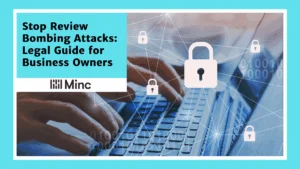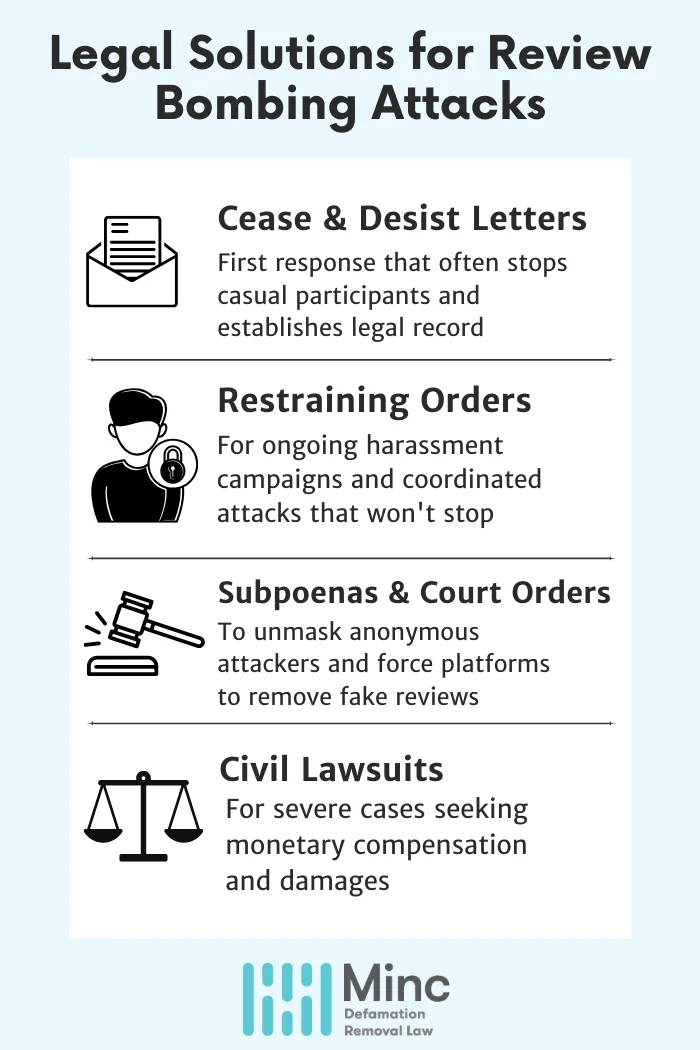
- Originally Published on July 21, 2025
Stop Review Bombing Attacks: Legal Guide for Business Owners
Review bombing attacks can devastate your business’s reputation overnight, flooding your online profiles with coordinated fake reviews designed to destroy customer trust and tank your search rankings. Unlike isolated negative reviews from unhappy customers, review bombing involves organized campaigns that can wipe out years of reputation-building in a matter of hours.
These attacks often target businesses caught up in political controversies, social media incidents, or competitive sabotage. The attackers may have never set foot in your establishment or used your services, but their malicious reviews can drive away real customers and cause immediate financial harm.
The good news? Review bombing is not protected speech when it involves false, coordinated attacks intended to cause harm. Platforms like Google and Yelp have policies against these campaigns, but when flagging and reporting fail, legal action may be necessary.
At Minc Law, we have helped countless business owners fight back against review bombing campaigns, removing thousands of fraudulent reviews and pursuing legal action against attackers. In this guide, we explain exactly what you need to know to respond quickly, remove harmful content, and protect your business.
What Is Review Bombing?
Review bombing is a targeted flood of fake or malicious online reviews aimed at damaging a business’s reputation. Unlike isolated negative reviews from dissatisfied customers, review bombing involves coordinated efforts by multiple individuals or groups to overwhelm a business with false, defamatory, or irrelevant negative reviews.
These attacks often stem from:
- Political disagreements with business owners or policies
- Competitor sabotage
- Social media controversies or viral incidents
- Organized harassment campaigns
- Disgruntled former employees seeking revenge
Why Review Bombing Hurts Businesses
The impact of review bombing extends far beyond hurt feelings. These attacks can:
Destroy Customer Trust: Potential customers rely heavily on online reviews when making purchasing decisions. In fact, 95% of consumers read reviews before making a purchase, and 94% say a negative review has convinced them to avoid a business. A sudden influx of fake, low-star reviews can make your business appear unreliable or problematic, driving away customers who never experienced your actual services.
Tank Search Rankings: Search engines like Google factor review scores and volume into local search rankings. According to local SEO experts, online reviews influence over 15% of how businesses rank in Google’s local results. A sudden drop in your average rating can push you lower in search results, making it harder for customers to find your business at the moment they need your services most.
Cause Immediate Revenue Loss: Studies show that a one-star decrease in Yelp ratings can lead to a 5-9% decrease in revenue. For small businesses, this can mean the difference between profitability and closure.
Create Long-term Reputation Damage: Even after fake reviews are removed, the psychological impact on your team and the lingering doubt in potential customers’ minds can persist for months or years.
How to Identify a Review Bombing Attack
Recognizing review bombing early is crucial for mounting an effective response. The sooner you identify the attack, the faster you can take action to minimize damage.
Common Red Flags
Sudden Spikes in 1-Star Reviews: The most obvious sign is an unusual surge in extremely negative reviews over a short period. If you typically receive a few reviews per week and suddenly get dozens of 1-star reviews in a single day, you’re likely under attack.
Repetitive Language or Fake-Sounding Accounts: Review bombers often use similar phrases, talking points, or even copy-paste identical content. Look for:
- Reviews that use nearly identical wording
- Accounts with generic names or obvious fake profiles
- Reviewers with no profile pictures or minimal account history
- Reviews posted from accounts created recently
Reviews Referencing Unrelated Issues: Legitimate customer reviews focus on the actual products or services you provide. Review bombing often includes complaints about:
- Political stances you’ve allegedly taken
- Social issues unrelated to your business
- Events that never occurred at your location
- Services you don’t even offer
Geographic Inconsistencies: If you’re a local business but suddenly receiving reviews from people claiming to be customers from across the country or world, this is a clear red flag.
Timing Patterns: Review bombs often coincide with specific events, such as news coverage, social media posts, or viral incidents. If the timing aligns with a controversial event, the reviews are likely coordinated.
Immediate Response Steps: What to Do in the First 48 Hours
When you discover you’re under a review bombing attack, your immediate response can significantly impact the outcome.
Don’t Panic or React Publicly
The most important thing to remember is not to panic or react publicly. Your first instinct may be to respond defensively to every fake review, but this often makes the situation worse. Public reactions can draw more attention to the attack, provide ammunition for additional fake reviews, make you appear unprofessional or defensive, and potentially escalate the situation.
Document Everything
Time is critical when building your case. Begin by taking full screenshots of every fake review. Make sure to capture:
- The complete review text and star rating
- The reviewer’s profile information and photo
- The exact date and time of posting
- The review’s position relative to other reviews
Track the Timeline
Note when the attack began and document the pattern of review posting to establish coordination. Monitor your current overall rating, total review count, and search ranking positions as baseline measurements for later comparison.
Alert Your Team
Inform your staff about the situation so they can:
- Avoid responding to fake reviews on social media
- Direct customer inquiries about the reviews to management
- Focus on providing excellent service to legitimate customers
- Help identify any reviews that might be from actual customers
Preserve Evidence of Coordination
Look for and document signs that the attack is organized:
- Similar language or talking points across reviews
- Reviews posted in rapid succession
- Accounts created around the same time
- Geographic patterns that don’t match your customer base
How to Report Fake Reviews
Before taking legal action, the first step in responding to review bombing should be reporting the fake reviews directly to the platforms where they appear. Google, Yelp, Facebook, and other major platforms have clear policies against fraudulent or malicious content, and in some cases, they will remove fake reviews without requiring escalation or direct interaction with the individuals who posted them.
Reporting Review Bombing on Google
Google’s policies prohibit reviews that are “not based on real experiences” or that involve “coordinated behavior to manipulate a place’s rating,” both of which describe review bombing.
To report fake reviews on Google:
- Go to your Google Business Profile.
- Locate the review you want to report.
- Click “Report Review”.
- Select “Spam”.
- Click “Send Report”.
Reporting Review Bombing on Yelp
Yelp’s content guidelines prohibit reviews that are not based on a first-hand consumer experience or that are part of a coordinated attempt to manipulate a business’s star rating, both of which apply to review bombing.
To report fake reviews on Yelp:
- Log into your Yelp for Business account at biz.yelp.com.
- Locate the review in the Reviews section of your dashboard.
- Click the three-dot “More Options” icon next to the review.
- Select “Report Review.”
- Choose the reason that best applies (such as “It contains false information” or “It was posted by someone who didn’t have a customer experience”).
Yelp’s moderators will evaluate the review against their guidelines, which may take several days. You will receive an email notification once a decision is made.
Other Platforms
Here are helpful links for reporting fake reviews on other popular business rating websites:
What If the Platforms Don’t Act?
Even when fake reviews clearly violate platform guidelines, review platforms like Google and Yelp do not always take action. In many cases, reviews will not be removed unless you obtain a court order confirming that the content is defamatory.
If your reports are denied or ignored, and the reviews are false, malicious, and causing real harm to your business, the next step is to speak with an internet content removal attorney. An experienced internet content removal attorney can help you build a strong case, file the appropriate legal actions, and obtain a court order that compels the platform to remove the content.
What Legal Protections Do You Have Against Review Bombing?
When your business becomes the target of a review bombing campaign, you are not powerless. The law provides several avenues for protection and recourse against those who would damage your reputation through false and malicious reviews.
Can You Sue for Review Bombing?
Yes, in many cases, you can pursue legal action against review bombers. If the reviews are demonstrably false, malicious in intent, and causing measurable damage to your business, you may have grounds for a lawsuit. However, successful legal action requires careful documentation and a strategic approach.
Claims That May Apply
Defamation & Libel: This is the most common legal claim against review bombers. Defamation occurs when someone publishes false statements that harm your reputation. Since online reviews are written, they typically fall under libel (written defamation) rather than slander (spoken defamation).
To succeed in a defamation claim, you must prove:
- The statement was false
- It was published to a third party
- It caused damage to your reputation
- The defendant acted with at least negligence
Tortious Interference with Business Relations: This claim applies when someone intentionally disrupts your business relationships with customers. Review bombing campaigns often qualify because they’re designed to prevent potential customers from doing business with you.
Harassment or Cyberstalking: If the review bombing is part of a broader pattern of online harassment, you may have additional claims under state harassment or cyberstalking laws. This is particularly relevant when the attacks include personal threats or doxxing.
Conspiracy: When multiple individuals coordinate a review bombing campaign, you may be able to pursue conspiracy claims against the organizers and participants.
What About Free Speech?
A common misconception is that all online reviews are protected by the First Amendment.
Courts have consistently held that fraudulent reviews designed to manipulate the marketplace are not protected speech. The First Amendment protects honest opinions and genuine experiences, not coordinated deception campaigns.
At Minc Law, we’ve successfully helped businesses across the United States take swift legal action against coordinated online review attacks. Our team focuses exclusively on internet defamation and reputation management, and we know how to get results—often without ever filing a lawsuit. Our strategic approach combines legal expertise with practical solutions to restore your reputation quickly and effectively.
Legal Strategies Available (Beyond Filing a Lawsuit)
When platform reporting fails to remove fake reviews, legal intervention often becomes necessary. However, litigation is not always the first or best course of action. Experienced attorneys employ a strategic escalation approach that often resolves review bombing cases without the need for a courtroom appearance.
Cease and Desist Letters
The first step in most legal responses is sending professionally crafted cease-and-desist letters to the review bombers. These letters put attackers on notice that their conduct is illegal and demand they stop posting fake reviews immediately. A well-written cease and desist letter establishes a legal record of the fraudulent activity, demonstrates that you’re serious about protecting your business, and often scares off casual participants in review bombing campaigns.
Many review bombers are not prepared for legal consequences and will stop their attacks when confronted with formal legal action.
Restraining Orders and Court Orders
When review bombing involves harassment or ongoing coordinated attacks, courts can issue restraining orders to stop the behavior immediately. These court orders legally prohibit attackers from continuing to post fake reviews. When platforms refuse to remove obviously fake reviews, attorneys can also seek court orders compelling removal.
Identifying Anonymous Attackers
Many review bombers hide behind anonymous accounts. Attorneys can use subpoenas to review platforms and internet service providers to unmask anonymous attackers. Once identified, these individuals can be held legally accountable for their actions.
Civil Lawsuits for Damages
When other approaches fail or when the damage is severe, filing a civil lawsuit may be necessary. Successful lawsuits can result in monetary damages for lost business, harm to reputation, and the costs of reputation repair.

Need Help Now? Contact Minc Law
Review bombing attacks require an immediate and expert response to minimize damage and restore your reputation. At Minc Law, we have successfully removed thousands of fake reviews, unmasked anonymous attackers, and helped businesses across the United States restore their reputations quickly and discreetly.
Do not let online trolls destroy what you have worked years to build. Contact Minc Law today for a confidential consultation and learn how we can help protect your business reputation.
Call us at 216-373-7706 or use the contact form below to get started.
Get Your Free Case Review
Fill out the form below, and our team will review your information to discuss the best options for your situation.
This page has been peer-reviewed, fact-checked, and edited by qualified attorneys to ensure substantive accuracy and coverage.



